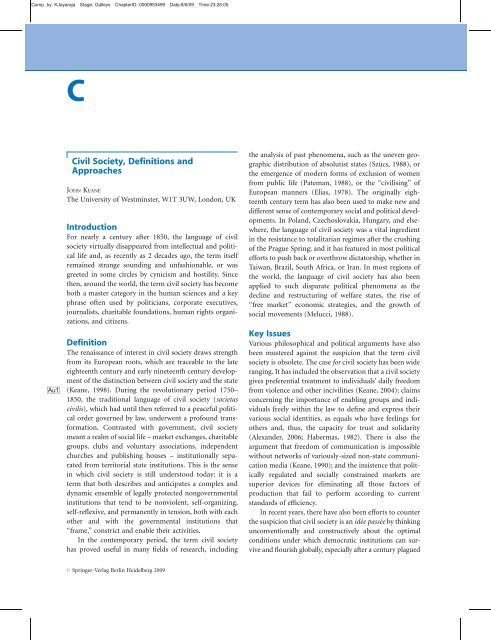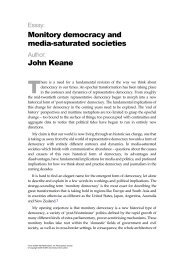Civil Society, Definitions and Approaches Introduction ... - John Keane
Civil Society, Definitions and Approaches Introduction ... - John Keane
Civil Society, Definitions and Approaches Introduction ... - John Keane
Create successful ePaper yourself
Turn your PDF publications into a flip-book with our unique Google optimized e-Paper software.
Comp. by: KJayaraja Stage: Galleys ChapterID: 0000953499 Date:8/6/09 Time:23:26:05<br />
C<br />
<strong>Civil</strong> <strong>Society</strong>, <strong>Definitions</strong> <strong>and</strong><br />
<strong>Approaches</strong><br />
JOHN KEANE<br />
The University of Westminster, W1T 3UW, London, UK<br />
<strong>Introduction</strong><br />
For nearly a century after 1850, the language of civil<br />
society virtually disappeared from intellectual <strong>and</strong> political<br />
life <strong>and</strong>, as recently as 2 decades ago, the term itself<br />
remained strange sounding <strong>and</strong> unfashionable, or was<br />
greeted in some circles by cynicism <strong>and</strong> hostility. Since<br />
then, around the world, the term civil society has become<br />
both a master category in the human sciences <strong>and</strong> a key<br />
phrase often used by politicians, corporate executives,<br />
journalists, charitable foundations, human rights organizations,<br />
<strong>and</strong> citizens.<br />
Au1<br />
Definition<br />
The renaissance of interest in civil society draws strength<br />
from its European roots, which are traceable to the late<br />
eighteenth century <strong>and</strong> early nineteenth century development<br />
of the distinction between civil society <strong>and</strong> the state<br />
(<strong>Keane</strong>, 1998).<br />
During the revolutionary period 1750–<br />
1850, the traditional language of civil society (societas<br />
civilis), which had until then referred to a peaceful political<br />
order governed by law, underwent a profound transformation.<br />
Contrasted with government, civil society<br />
meant a realm of social life – market exchanges, charitable<br />
groups, clubs <strong>and</strong> voluntary associations, independent<br />
churches <strong>and</strong> publishing houses – institutionally separated<br />
from territorial state institutions. This is the sense<br />
in which civil society is still understood today: it is a<br />
term that both describes <strong>and</strong> anticipates a complex <strong>and</strong><br />
dynamic ensemble of legally protected nongovernmental<br />
institutions that tend to be nonviolent, self-organizing,<br />
self-reflexive, <strong>and</strong> permanently in tension, both with each<br />
other <strong>and</strong> with the governmental institutions that<br />
‘‘frame,’’ constrict <strong>and</strong> enable their activities.<br />
In the contemporary period, the term civil society<br />
has proved useful in many fields of research, including<br />
# Springer-Verlag Berlin Heidelberg 2009<br />
the analysis of past phenomena, such as the uneven geographic<br />
distribution of absolutist states (Szücs, 1988), or<br />
the emergence of modern forms of exclusion of women<br />
from public life (Pateman, 1988), or the ‘‘civilising’’ of<br />
European manners (Elias, 1978). The originally eighteenth<br />
century term has also been used to make new <strong>and</strong><br />
different sense of contemporary social <strong>and</strong> political developments.<br />
In Pol<strong>and</strong>, Czechoslovakia, Hungary, <strong>and</strong> elsewhere,<br />
the language of civil society was a vital ingredient<br />
in the resistance to totalitarian regimes after the crushing<br />
of the Prague Spring; <strong>and</strong> it has featured in most political<br />
efforts to push back or overthrow dictatorship, whether in<br />
Taiwan, Brazil, South Africa, or Iran. In most regions of<br />
the world, the language of civil society has also been<br />
applied to such disparate political phenomena as the<br />
decline <strong>and</strong> restructuring of welfare states, the rise of<br />
‘‘free market’’ economic strategies, <strong>and</strong> the growth of<br />
social movements (Melucci, 1988).<br />
Key Issues<br />
Various philosophical <strong>and</strong> political arguments have also<br />
been mustered against the suspicion that the term civil<br />
society is obsolete. The case for civil society has been wide<br />
ranging. It has included the observation that a civil society<br />
gives preferential treatment to individuals’ daily freedom<br />
from violence <strong>and</strong> other incivilities (<strong>Keane</strong>, 2004); claims<br />
concerning the importance of enabling groups <strong>and</strong> individuals<br />
freely within the law to define <strong>and</strong> express their<br />
various social identities, as equals who have feelings for<br />
others <strong>and</strong>, thus, the capacity for trust <strong>and</strong> solidarity<br />
(Alex<strong>and</strong>er, 2006; Habermas, 1982). There is also the<br />
argument that freedom of communication is impossible<br />
without networks of variously-sized non-state communication<br />
media (<strong>Keane</strong>, 1990); <strong>and</strong> the insistence that politically<br />
regulated <strong>and</strong> socially constrained markets are<br />
superior devices for eliminating all those factors of<br />
production that fail to perform according to current<br />
st<strong>and</strong>ards of efficiency.<br />
In recent years, there have also been efforts to counter<br />
the suspicion that civil society is an idée passée by thinking<br />
unconventionally <strong>and</strong> constructively about the optimal<br />
conditions under which democratic institutions can survive<br />
<strong>and</strong> flourish globally, especially after a century plagued
Comp. by: KJayaraja Stage: Galleys ChapterID: 0000953499 Date:8/6/09 Time:23:26:05<br />
2 C<br />
<strong>Civil</strong><br />
<strong>Society</strong>, <strong>Definitions</strong> <strong>and</strong> <strong>Approaches</strong><br />
by revolutionary upheavals, total war, totalitarianism, dictatorship,<br />
<strong>and</strong> state dirigisme marked by dysfunctions<br />
caused by ‘‘the overreach of the state’’ (Ch<strong>and</strong>hoke,<br />
1995). For the first time in their history, the political<br />
languages of democracy <strong>and</strong> civil society have become<br />
conjoined. Democracy has come to mean a special type<br />
of political system <strong>and</strong> way of life in which civil society<br />
<strong>and</strong> government tend to function as two necessary moments,<br />
separate but contiguous, distinct but interdependent,<br />
internal articulations of a system in which the<br />
exercise of power, whether in the spheres of civil society or<br />
government, is subject to public monitoring, compromise,<br />
<strong>and</strong> agreement (<strong>Keane</strong>, 1988a, 1998). Seen in this novel<br />
way, democratization is defined as neither the extension<br />
of state power into the non-state sphere of civil society<br />
nor the abolition of government <strong>and</strong> the building of<br />
spontaneous agreement among citizens living within<br />
civil society. The unending quest for democracy, so it is<br />
claimed, must instead steer a course between these two<br />
unworkable <strong>and</strong> undesirable extremes. Democracy is seen<br />
as a never-ending process of apportioning <strong>and</strong> publicly<br />
monitoring the exercise of power by citizens within polities<br />
marked by the institutionally distinct – but always<br />
mediated – realms of civil society <strong>and</strong> government institutions.<br />
The revised underst<strong>and</strong>ing of democracy as more than<br />
simply government by means of periodic elections, party<br />
competition, majority rule, <strong>and</strong> the rule of law has had<br />
wide global appeal. Truly remarkable is the way the language<br />
of civil society has in recent decades traveled to<br />
virtually all regions of the globe. The global talk of civil<br />
society is evidently bound up with the dramatic growth,<br />
especially during the second half of the twentieth century,<br />
of nongovernmental business <strong>and</strong> civic organizations<br />
operating within <strong>and</strong> beyond the borders of territorial<br />
states. It is even possible that the global extension of the<br />
concept signals a first step in the long-term emergence of<br />
common frameworks of meaning <strong>and</strong> identity underneath<br />
<strong>and</strong> across state boundaries – a trend that resonates<br />
with, <strong>and</strong> practically reinforces, such trends as the globalization<br />
of communication media, the rebirth of international<br />
humanitarian law, <strong>and</strong> the growth of a shared<br />
(if diffuse) sense within nongovernmental organizations<br />
<strong>and</strong> publics at large that civilians have obligations to other<br />
civilians living beyond their borders, simply because they<br />
are civilians.<br />
A measure of the ‘‘emigration’’ of the term from its<br />
European birthplace is the way that the contemporary<br />
renewal of interest in civil society first began during<br />
the second half of the 1960s in Japan (Uchida, 1967;<br />
Hirata, 1969). In Latin America, neo-Gramscian versions<br />
of the concept of civil society were subsequently used as<br />
a theoretical weapon against dictatorship (O’Donnell<br />
<strong>and</strong> Schmitter, 1986). Scholarly studies of sub-Saharan<br />
Africa also emphasized how associational life – farmers’<br />
organizations, lawyers’ <strong>and</strong> journalists’ associations,<br />
mineworkers’ unions, Christian churches <strong>and</strong> Islamic<br />
brotherhoods – are most likely to thrive in the presence<br />
of effective states; <strong>and</strong> how, paradoxically, weak states<br />
can become stronger – more effective at promoting the<br />
accumulation <strong>and</strong> better distribution of wealth, <strong>and</strong> improving<br />
their own legitimacy <strong>and</strong> power potential – by<br />
allowing a good measure of pluralism in associational life<br />
(Bratton, 1989). There have been as well many studies of<br />
Muslim-majority states guided by civil society perspectives<br />
(Norton, 1994 [1996]; Mardin, 1995).<br />
International Perspectives<br />
Important controversies have erupted concerning how to<br />
translate the originally European term civil society into<br />
local Asian languages. Some Chinese scholars, for instance,<br />
prefer the term ‘‘citizen society’’ (gongmin shehui), while<br />
others prefer to speak of ‘‘civilised society’’ (wenming<br />
shehui) or ‘‘urban society’’ (shimin shehui). And in the<br />
Korean peninsula, recent analyses have highlighted the contrasts<br />
between the totalitarian state of North Korea, whose<br />
rulers appear to have enjoyed firm control of an obedient<br />
population, <strong>and</strong> South Korea, in which the long <strong>and</strong> bloody<br />
transition from the authoritarian rule of Syngman Rhee,<br />
toppled by a student uprising in 1960, has been fuelled by<br />
the vigorous rebirth of civil society, whose roots are traceable<br />
to the struggle against Japanese colonization (1910–1945)<br />
<strong>and</strong> the massive peasant rebellions, called the Tonghak<br />
Uprisings, of the late nineteenth century (Koo, 1993).<br />
The spreading popularity of the language of civil society,<br />
even the invention of the term ‘‘global civil society’’<br />
(Anheier et al., 2001; <strong>Keane</strong>, 2003), has had many effects,<br />
including the multiplication of its different <strong>and</strong> sometimes<br />
conflicting meanings. The growing popularity of<br />
the term civil society has bred some confusion, <strong>and</strong> this<br />
implies the need for greater clarity <strong>and</strong> care in the way it is<br />
used. Three crisscrossing but different ways of wielding<br />
the category of civil society can be identified. Although<br />
these approaches sometimes overlap <strong>and</strong> complement<br />
each other, they also tend to produce divergent claims<br />
<strong>and</strong> should therefore be distinguished.<br />
Some writers use the term ‘‘civil society’’ as an idealtyp<br />
to analyze <strong>and</strong> interpret the empirical contours of past,<br />
present, or emergent relationships between social <strong>and</strong><br />
political forces <strong>and</strong> institutions. The immediate or<br />
avowed aim of such empirical-analytic interpretations of<br />
civil society is not to recommend courses of political
Comp. by: KJayaraja Stage: Galleys ChapterID: 0000953499 Date:8/6/09 Time:23:26:06<br />
action or to form normative judgments. Rather, the language<br />
of civil society is used to develop an explanatory<br />
underst<strong>and</strong>ing of a complex sociopolitical reality by means<br />
of theoretical distinctions, empirical research <strong>and</strong> informed<br />
judgments about its origins, patterns of development <strong>and</strong><br />
(unintended) consequences. Although empirical-analytic<br />
interpretations of civil society usually alter perceptions of<br />
what is or is not significant within any given reality, the<br />
term is mainly used for observational purposes: that is, to<br />
describe that reality, or criticize prevailing descriptions of<br />
it, in order better to clarify what is otherwise a potentially<br />
confusing <strong>and</strong> disorientating reality.<br />
The language of civil society can also be used in<br />
‘‘pragmatic’’ ways, as a guide to formulating a social<br />
<strong>and</strong> political strategy or action program for achieving<br />
a predefined or assumed political good. In contrast to<br />
empirical-analytic-interpretative approaches, which are<br />
concerned with such intellectual tasks as naming, categorizing,<br />
observing, theorizing, comparing, <strong>and</strong> underst<strong>and</strong>ing,<br />
strategic usages of the term have an eye for defining<br />
what must or must not be done so as to reach a given<br />
political goal. The term civil society is bound up with<br />
efforts to calculate the tactical means of achieving or<br />
preserving certain ends.<br />
This pragmatic usage is traceable to the last quarter of<br />
the eighteenth century, to recommendations, like Thomas<br />
Paine’s revolutionary pamphlet Common Sense (1776),<br />
about how best to contest despotic power by establishing<br />
the earthworks of civil society. Recent comparative studies<br />
of the defeat of various forms of political despotism in<br />
southern Europe, Latin America <strong>and</strong> postcommunist<br />
countries develop this line of thinking (Linz <strong>and</strong> Stepan,<br />
1996). They show the vital role played by civil society in<br />
the transition towards democracy, <strong>and</strong> its subsequent<br />
consolidation. A robust civil society can start transitions,<br />
help block reversals, generate political alternatives <strong>and</strong><br />
keep post-authoritarian governments <strong>and</strong> states on their<br />
toes.<br />
Still other scholars <strong>and</strong> activists view the term civil<br />
society from a normative st<strong>and</strong>point – in order to highlight<br />
the ethical superiority of a politically guaranteed civil<br />
society compared with other types of government. Since<br />
the eighteenth century, disputes about the normative status<br />
of civil society have flourished. Some thinkers (Georg<br />
Forster, Thomas Jefferson) have considered civil society to<br />
be the earthly expression of God-given natural rights.<br />
Others interpret the concept from within the framework<br />
of a theory of history that supposes either that civil society<br />
is a moment in the actualization of the ethical idea, of<br />
mind (Geist) actively working its way into the existing<br />
world (Hegel); or that civil society is a passing moment<br />
<strong>Civil</strong> <strong>Society</strong>, <strong>Definitions</strong> <strong>and</strong> <strong>Approaches</strong> C<br />
in the development <strong>and</strong> overcoming of modern, classdivided<br />
bourgeois society (as Marx <strong>and</strong> others within<br />
the communist tradition supposed). Other scholars have<br />
considered civil society as a spontaneous group-centered<br />
expression of ‘‘loving kindness <strong>and</strong> fraternity’’ (Durkheim,<br />
1915). And there are thinkers (steeped in the originally<br />
conservative reverence for tradition) who interpret civil<br />
society as a customary, time-bound ensemble of precious<br />
institutions <strong>and</strong> practices that are confined to certain<br />
regions of the earth <strong>and</strong> perforce do not enjoy any metahistorical<br />
guarantee that they will flourish, let alone<br />
survive.<br />
These are just samples of the bewildering plurality of<br />
normative justifications of civil society, but they illustrate<br />
why some critics have been tempted to draw the conclusion<br />
that civil society is a muddled, essentially contested<br />
ideal (Seligman, 1992). Their conclusion plausibly highlights<br />
the polysemic quality of the term civil society, but<br />
both the complaint <strong>and</strong> the conclusion arguably ab<strong>and</strong>on,<br />
prematurely, the possibility of normatively justifying civil<br />
society in fresh, publicly relevant ways. In particular, these<br />
critics fail to see that the plural structures of a civil society<br />
are best expressed through non-foundational normative<br />
justifications that recognize, <strong>and</strong> actively muster support<br />
<strong>and</strong> respect for, a multiplicity of normative ways of life.<br />
This is to say that the term civil society is a signifier of<br />
plurality, the friend <strong>and</strong> guardian of dynamic difference.<br />
Future Directions<br />
Ethically speaking, civil society is not a First Principle; it<br />
is the precondition of freedom from any kind of First<br />
Principle. Attempts to build gr<strong>and</strong> normative theories of<br />
civil society should therefore be doubted. For to speak<br />
of civil society is to warn against the harm caused by<br />
organized attempts to impose on others particular norms<br />
not of their choosing. When seen in this revised way, the<br />
civil society norm breaks with the bad monist habit of<br />
philosophically justifying ethical norms by referring back<br />
to a substantive grounding principle, such as the early<br />
modern notions of God-given justice, natural rights or<br />
the principle of utility, or more recent attempts to justify<br />
civil society according to such grounding principles as<br />
rational argumentation (Habermas) or knowledge of a<br />
‘‘good which we can know in common’’ (S<strong>and</strong>el).<br />
From this revised perspective, normative support for<br />
civil society has no need of so-called Absolutes. To the<br />
contrary: the choice to favor civil society implies suspicion<br />
of the moralizing faith in Gr<strong>and</strong> Ideals such as the<br />
State, Nation, Progress, Socialism, Free Markets, God,<br />
Truth, or Ethics. Positively speaking, support for civil<br />
society implies the duty of citizens <strong>and</strong> policy makers<br />
3
Comp. by: KJayaraja Stage: Galleys ChapterID: 0000953499 Date:8/6/09 Time:23:26:09<br />
4 C<br />
<strong>Civil</strong><br />
<strong>Society</strong>, <strong>Definitions</strong> <strong>and</strong> <strong>Approaches</strong><br />
to defend greater pluralism – to cast serious doubt on<br />
dogmatic, falsely universal norms by giving greater emphasis<br />
to the recognition of institutional complexity <strong>and</strong><br />
public accountability as vital barriers against dangerous<br />
accumulations of power, whenever <strong>and</strong> wherever they<br />
develop. To speak favorably of civil society is not to plummet<br />
into so-called relativism, with its self-contradictory<br />
insistence that there are no certain or preferable guidelines<br />
in life. It is rather to be committed everywhere to the<br />
construction, preservation, <strong>and</strong> development of a legally<br />
protected nongovernmental order, whose diverse identities,<br />
mediated by representative mechanisms such as<br />
political parties <strong>and</strong> independent communication media,<br />
together ensure that hierarchies <strong>and</strong> abuses of power are<br />
checkable. The converse equally applies: anyone who does<br />
not recognize <strong>and</strong> respect the need for the institutions of<br />
civil society, government <strong>and</strong> their intermediaries, or who<br />
works actively against them, even to destroy them, is no<br />
friend of pluralism – <strong>and</strong> perhaps even its dangerous foe.<br />
<strong>Civil</strong> society, in short, is an actual or anticipated condition<br />
of possibility of the ongoing struggle for egalitarian diversity.<br />
Those who practically deny civil society in this normative<br />
sense are probably arrogant monists – <strong>and</strong> most<br />
likely manipulators, bullies, tyrants, or totalitarians.<br />
References/Readings<br />
Alex<strong>and</strong>er, J. C. (2006). The civil sphere. New York: Oxford University<br />
Press.<br />
Anheier, et al. (Eds.) H., (2001). <strong>Civil</strong> society. Oxford/New York: Oxford<br />
University Press.<br />
Bratton, M. (April 1989). Beyond the state: <strong>Civil</strong> society <strong>and</strong> associational<br />
life in Africa. World Politics, 41, 404–430.<br />
Ch<strong>and</strong>hoke, N. (1995). State <strong>and</strong> civil society: Explorations in political<br />
theory. New Delhi, India: Sage.<br />
Durkheim, E. (1915). ‘L’Allemagne au-dessus de tout’. La mentalité<br />
allem<strong>and</strong>e et la guerre. Paris: Arm<strong>and</strong> Colin.<br />
Elias, N. (1978). The civilizing process: The history of manners (Vol. 1).<br />
New York: Pantheon Books.<br />
Habermas, J. (1982). Theorie des kommunikativen H<strong>and</strong>elns. Frankfurt<br />
am Main, Germany: Suhrkamp.<br />
Hirata, K. (1969). Shimin-Shakai to Shakaishugi (<strong>Civil</strong> <strong>Society</strong> <strong>and</strong><br />
Socialism). Tokyo: Iwanami-Shoten.<br />
<strong>Keane</strong>, J. (1988a). Democracy <strong>and</strong> civil society. London/New York: Verso.<br />
<strong>Keane</strong>, J. (Ed.) (1988b). Despotism <strong>and</strong> democracy. The origins <strong>and</strong><br />
development of the distinction between civil society <strong>and</strong> the state,<br />
1750–1850. In <strong>Civil</strong> society <strong>and</strong> the state. New european perspectives.<br />
London/New York: Verso.<br />
<strong>Keane</strong>, J. (1990). The media <strong>and</strong> democracy. London/New York: Polity<br />
Press.<br />
<strong>Keane</strong>, J. (1998). <strong>Civil</strong> society: Old images, new visions. Stanford, CA:<br />
Stanford University Press.<br />
<strong>Keane</strong>, J. (2003). Global civil society. Cambridge: Cambridge University<br />
Press.<br />
Au2<br />
<strong>Keane</strong>, J. (2004). Violence <strong>and</strong> democracy. Cambridge/New York:<br />
Cambridge University Press.<br />
Koo, H. (Ed.) (1993). State <strong>and</strong> society in contemporary Korea. Ithaca, NY:<br />
Cornell University Press.<br />
Linz, J. J., & Stepan, A. (1996). Problems of democratic transition <strong>and</strong><br />
consolidation: Southern Europe, South America, <strong>and</strong> post-communist<br />
Europe. Baltimore, MD/London: <strong>John</strong> Hopkins University Press.<br />
Mardin, S. (1995). <strong>Civil</strong> society <strong>and</strong> Islam. In J. A. Hall (Ed.), <strong>Civil</strong> society:<br />
Theory, history, comparison. Cambridge: Polity Press.<br />
Melucci, A. (1988). Nomads of the present: Social movements <strong>and</strong> individual<br />
needs in contemporary society. London/Philadelphia: Temple<br />
University Press.<br />
Norton, Augustus Richard. (Ed.) (1994 [1996]). <strong>Civil</strong> society in the middle<br />
east (Vol. 2). New York: Brill.<br />
O’Donnell, G., & Schmitter, P. C. (1986). Resurrecting civil society.<br />
In Transitions from authoritarian rule: Tentative conclusions about<br />
uncertain democracies (pp. 48–56). Baltimore, MD/London: <strong>John</strong><br />
Hopkins University Press.<br />
Pateman, C. (1988). The sexual contract. Cambridge: Polity Press.<br />
Seligman, A. B. (1992). The idea of civil society. New York/Toronto:<br />
The Free Press.<br />
Szücs, J. (1988). Les Trois Europes. Paris: L’Harmattan.<br />
Uchida, Y. (1967). Nihon Shihonshugi no Shiso-zo (Images of Japanese<br />
capitalism through the social sciences). Tokyo: Iwanami-Shoten.






